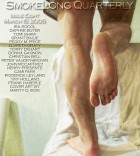The motif of clean/dirt adds so many layers to this story. What’s the key to creating such motifs without overdoing it?
Hmm…I’m big on motifs. I guess what helped in this story was writing about it from the mother’s point of view. Writing about it from the son’s point of view would have made it easier to get sucked into his concerns and carried away by them. I have a tendency to really worry about cleanliness myself. I’m one of those people with the anti-bacterial wipes in my car and my bag and my desk. So, I can understand Claude’s concerns, but then when I think about Alice, outside the door waiting for him, I realize how scared she really is. In a way, they’re both gripped by a strong fear and have more in common than they realize. They’re both attempting to control that fear.
The story, for me, touches upon both archetypal parental fears and more recent, modern ones. What are today’s parents to do?
Wow, that’s a hard question. I have a two-year old, and I thought I worried a lot before she was born. Ha! I found out I was pregnant right after the September 11th attacks. It seemed the worst time to even consider bringing another vulnerable creature into the world. However, I think things like those attacks put smaller fears, like those about germs or how your kids do in preschool, into perspective. Mostly, I hold on to how happy I am to be a parent. I struggled for years with infertility. I am still amazed to be a parent and, moreover, amazed more by my daughter every day. A friend said, “she’s your best work,” and she is.
We were all blown away by how you nailed that ending. Any advice for those of us who more often than not take an extra step on the dismount?
The Ending. I have a thing about beginnings and endings. I’m very big on a hook at the beginning if at all possible. My endings are very much influenced by the fact that I started out writing poetry. There’s a lot less words in a poem, generally speaking, and each one needs to be just right. That makes you really consider every word you put on the page. The ending is the most important part of a poem, and I really worked on them. In fiction, I think the key to endings is making sure the story is in control—not you. If you try to force the ending you’ll kill it. In this case, I thought, now what would I do if I were Alice? I’m a very practical person, and I realized I wouldn’t be able to just sit there and that there was no other way to stop him. Claude was going to wash until he was clean—which would be never according to his standards—or until someone stopped him. I couldn’t see Alice walking in on him. She respects him too much. Once I knew the water had to stop, I thought of my husband who is always trying to teach me basic plumbing and electricity. That’s his finger pointing at the end- although his hands are much cleaner.
Should we be calling you Dr. Holland?
I guess you could. Actually, my friends jokingly have taken to calling me Dr.Tiff, even some of my students.
How has teaching creative writing affected your own writing?
I think that my writing has definitely affected how I teach creative writing- it’s made me more patient, and I really have an idea of what my students are going through. I’m not afraid to share that with them, and they always seem to appreciate the fact that I’m willing to share my own process. As for whether teaching creative writing has affected my writing, that’s a harder question. I had so many changes the same time I started really teaching creative writing- a new baby, a big move, etc. I’m not really writing as much as I would like. I know people who do the assignments along with their students, and I think that helps keep you motivated to write. For me, time is the biggest issue. Otherwise, sometimes when I’m writing, I imagine my students as the audience. I think when you’re still part of an MFA or PhD program you imagine your professors as your audience. My professors are still part of my audience, but my audience has gotten bigger. I want my students to be proud of me and also to know that they can do this, too.



 The core workshop of SmokeLong Fitness is all in writing, so you can take part from anywhere at anytime. We are excited about creating a supportive, consistent and structured environment for flash writers to work on their craft in a community. We are thrilled and proud to say that our workshop participants have won, placed, or been listed in every major flash competition. Community works.
The core workshop of SmokeLong Fitness is all in writing, so you can take part from anywhere at anytime. We are excited about creating a supportive, consistent and structured environment for flash writers to work on their craft in a community. We are thrilled and proud to say that our workshop participants have won, placed, or been listed in every major flash competition. Community works.